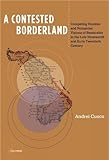A Contested Borderland : Competing Russian and Romanian Visions of Bessarabia in the Second Half of the 19th and Early 20th Century / Andrei Cusco.
Material type: TextSeries: Historical Studies in Eastern Europe and EurasiaPublisher: Budapest ; New York : Central European University Press, [2017]Copyright date: 2017Description: 1 online resource (350 p.)Content type:
TextSeries: Historical Studies in Eastern Europe and EurasiaPublisher: Budapest ; New York : Central European University Press, [2017]Copyright date: 2017Description: 1 online resource (350 p.)Content type: - 9789633861608
- 947.608
- online - DeGruyter
| Item type | Current library | Call number | URL | Status | Notes | Barcode | |
|---|---|---|---|---|---|---|---|
 eBook
eBook
|
Biblioteca "Angelicum" Pont. Univ. S.Tommaso d'Aquino Nuvola online | online - DeGruyter (Browse shelf(Opens below)) | Online access | Not for loan (Accesso limitato) | Accesso per gli utenti autorizzati / Access for authorized users | (dgr)9789633861608 |
Frontmatter -- Contents -- Introduction -- Chapter I. Empire- and Nation-Building in Russia and Romania: Discourses and Practices -- Chapter II. Southern Bessarabia as an Imperial Borderland: Diplomatic and Political Dilemmas -- Chapter III. Rituals of Nation and Empire in Early Twentieth-Century Bessarabia: The Anniversary of 1912 and its Significance -- Chapter IV. Three Hypostases of the “Bessarabian Refugee”: Hasdeu, Stere, Moruzi, and the Uncertainty of Identity -- Chapter V. Revolution, War, and the “Bessarabian Question”: Russian and Romanian Perspectives (1905–16 -- Conclusion -- Instead of an Epilogue: Autonomy, Federalism, or National Unification (1917–18)? -- Bibliography
restricted access online access with authorization star
http://purl.org/coar/access_right/c_16ec
Bessarabia―mostly occupied by modern-day republic of Moldova―was the only territory representing an object of rivalry and symbolic competition between the Russian Empire and a fully crystallized nation-state: the Kingdom of Romania. This book is an intellectual prehistory of the Bessarabian problem, focusing on the antagonism of the national and imperial visions of this contested periphery. Through a critical reassessment and revision of the traditional historical narratives, the study argues that Bessarabia was claimed not just by two opposing projects of ‘symbolic inclusion,’ but also by two alternative and theoretically antagonistic models of political legitimacy. By transcending the national lens of Bessarabian / Moldovan history and viewing it in the broader Eurasian comparative context, the book responds to the growing tendency in recent historiography to focus on the peripheries in order to better understand the functioning of national and imperial states in the modern era.
Mode of access: Internet via World Wide Web.
In English.
Description based on online resource; title from PDF title page (publisher's Web site, viewed 20. Nov 2024)


